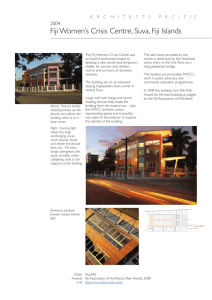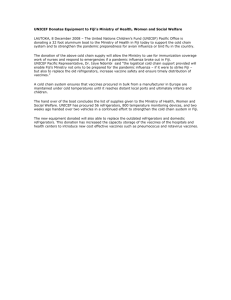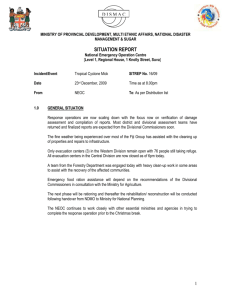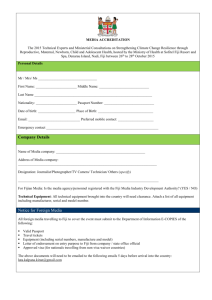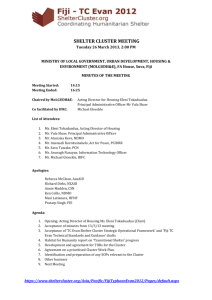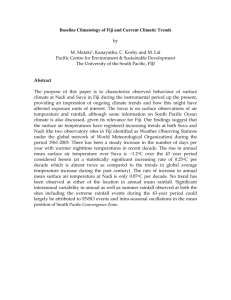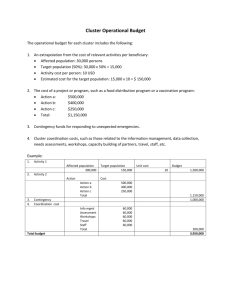Fiji National Clusters 130307
advertisement
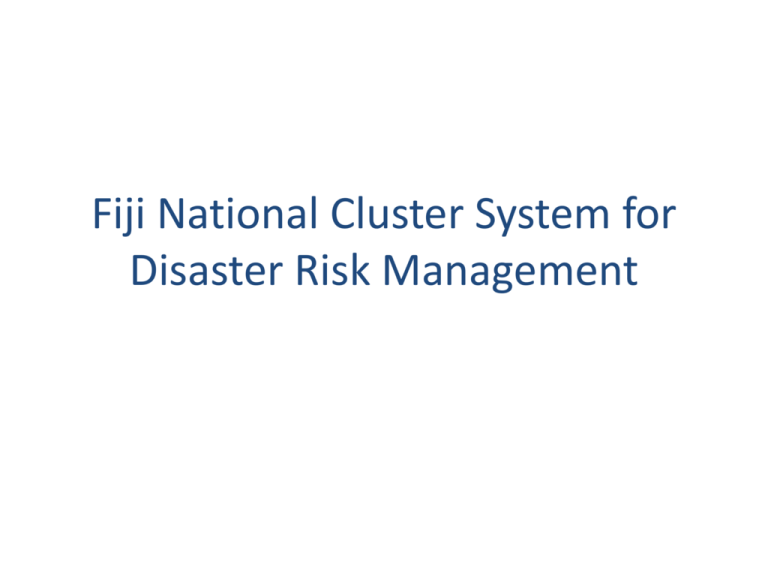
Fiji National Cluster System for Disaster Risk Management Cluster System for Coordination • Coordination in emergencies is vital – Less gaps and overlaps – Coherent, complementary approach – Working together for better collective results • Global Cluster coordination system adopted • Clusters: – Are groups of organisations working in the main sectors of humanitarian action – Provide a clear point of contact and are accountable for adequate, appropriate action – Create partnerships between international humanitarian actors, national & local authorities, and civil society. Global Cluster System From Global System to National System • Workshop held Suva (Holiday Inn) on 19/20 November – attended by wide range of stakeholders at National and Divisional Level • Workshop identified need for improvements in coordination • Eight Clusters identified for Fiji, based on Global system – Adoption of Global Clusters assists understanding of the role of the cluster, with access to TORs, SOPs – Close relationship to Global helps potential for assistance for partnering, training, related funding Fiji Disaster Management National Clusters WASH Public works & Utilities Health & Nutrition CORE Coordination Education Shelter Planning Funding Safety & Protection Logistics Food Security & Livelihoods Preparedness The arrangements and systems to ensure that communities are prepared should an emergency occur and that all those resources and systems which are needed to cope with the affects can be efficiently mobilised and deployed. Fiji Disaster Management Cluster Roles Response WASH The actions taken in anticipation of, during, and immediately after, an emergency or disaster to ensure that all the impacts are minimised and that people affected are given immediate relief and support. Early Recovery Coordinated processes for post-crisis recovery that are resilient and sustainable, encompassing the restoration of basic services, livelihoods, transitional shelter, security, environment and other socioeconomic dimensions including reintegration of displaced populations. Shelter Food Security & Livelihoods NDMO NEOC Education Health & Nutrition Safety & Protection Logistics Public Works & Utilities Fiji Disaster Management Existing Structure Permanent bodies of the Disaster Management Structure Disaster Management Structure during emergency operations Fiji Disaster Management National Cluster Framework CABINET Minister for Provincial Development and National Disaster Management NDMC National Disaster Controller DSLOs WASH Shelter Food Security National DISMAC NDMO NEOC Safety & Protection Logistics Division DISMAC Education Health & Nutrition Public Works Divisions WASH Shelter Food Security Provinces Districts DISEOC Communities Cities / Towns / Villages / Rural Areas District DISMAC DIVEOC Education Health & Nutrition Safety & Protection Logistics Public Works Fiji Disaster Management National Clusters and Pacific Humanitarian Team Fiji Disaster Management National Clusters and Pacific Humanitarian Team Emergency Relief Coordinator Resident Coordinator Pacific Humanitarian Team National Cluster Division Cluster District Cluster Partnership Fiji Disaster Management National Clusters at Divisional and District Levels DSLOs NEOC Division HODs DivEOC District/Provincial HODs DisEOC Fiji Disaster Management National Clusters at Divisional and District Levels DSLOs NEOC Division HODs DivEOC Clusters form partnerships at District /Province Level District/Provincial HODs DisEOC Fiji Disaster Management. Cluster Lead and CoLead Roles The role of the Cluster Lead to facilitate the work of the Cluster, to ensure: Key Partners are included Appropriate coordination Cross-cutting issues are addressed Effective needs assessment and analysis Adequate contingency planning and preparedness Application of standards, monitoring and reporting Advocacy and resource mobilisation Training and capacity building The role of the Cluster Co-Lead should be to provide technical support to the Lead as required Core Agencies Government Lead NDMO Co-Lead UNOCHA Key Partners Cluster Leads and Co-Leads Ministry of Finance Ministry of Foreign Affairs and International Cooperation Prime Minister's Office Ministry of Public Enterprises, Communications, Civil Aviation and Tourism Ministry of Strategic Planning, National Development & Statistics Ministry of Information Itaukei Affairs Public Service Commission Fiji Red Cross The Core of the proposed Fiji DM Cluster system is to provide all of the services required to ensure that the work of each Cluster is appropriately facilitated, coordinated and supported. Roles for the Core are summarised as coordination, planning, and funding. The NDMO is listed as the logical lead for the Core, with UNOCHA playing a supporting CoLead role for coordination, information and assisting efforts for international assistance where deemed necessary. 1. Education Agencies Government Lead Ministry of Education Co-Lead UNICEF, Save the Children Key Partners Embassy of Japan AQEP (Access to Quality Education Program) AusAID Ministry of Provincial Development - Divisional Offices UNOCHA UNWomen The Education Cluster is accountable for ensuring a more predictable, timely and effective education response, with inter-sectoral links to other relevant clusters. Inter-Agency Network for Education in Emergencies – website http://www.ineesite.org/post /educationcluster/ 2. Public Works & Utilities Agencies Government Lead Ministry of Works, Transport and Public Utilities Co-Lead NDMO Key Partners Fiji Electricity Authority Water Authority of Fiji Fiji Meterological Service Fiji Roads Authority Mineral Resources RFMF Police NFA Corrections Ministry of Provincial Development - Divisional Offices Land Transport Authority Government Shipping Services Telecom Fiji Limited Fiji Islands Maritime Safety Administration Civil Aviation Authority of Fiji Prisons and Corrections Forestry Department SPC The goal of the Public Utilities and Works Cluster is to: plan and implement public utility preparedness activities to help build resilience to disasters respond to the impacts of disasters so that affects on public utilities are minimised and people are not placed at risk, and deliver early recovery works to allow a return to normalcy as soon as possible. Public utilities are defined as all of the utilities and infrastructure required for communities to operate normally, including electricity, water, roads, transport, communications, shipping and civil aviation. 3. Health & Nutrition Agencies Government Lead Ministry of Health Co-Lead WHO Key Partners Department of Agriculture (DOA) Fiji Health Sector Support Program Ministry of Provincial Development - Divisional Offices NDMO FIBOS (Data on EA) UNICEF FAO SPC UNFPA FRCS Fiji Disabled Persons Federation Empower Pacific UNOCHA AusAID IFRC The Health Cluster goal is to reduce avoidable mortality, morbidity and disability and restore the delivery of and equitable access to preventative and curative health care as quickly as possible and in as sustainable a manner as possible The Health Cluster includes nutrition activities. 4. WASH Agencies Government Lead Ministry of Health (Environmental Health) Co-Lead UNICEF Key Partners Ministry of Women, Social Welfare & Poverty Alleviation WAF MWT&PU(WSD) FRCS Ministry of Provincial Development - Divisional Offices WHO SPC UNDP UN Women IFRC Save the Children AusAID NZAID Fiji Water Foundation (Rotary) Fiji Live and Learn Fiji Water / Aqua ADRA Habitat for Humanity UNOCHA The goal for the Water, Sanitation and Hygiene Cluster is to improve the efficiency and effectiveness of WASH interventions in emergencies by ensuring effective system-wide preparedness, providing the ability to deliver an immediate and appropriate response and participating in actions to facilitate early recovery. 5. Shelter Agencies Government Lead Ministry of Local Government, Urban Development, Housing & Environment Co-Lead IFRC Key Partners MOPD&NDM (Rural Housing) Ministry of Women, Social Welfare & Poverty Alleviation Ministry of Provincial Development - Divisional Offices UN Habitat MoH FRCS MOE Habitat for Humanity Fiji UNWomen Housing Authority AusAID NZAID PRB UNOCHA Fiji Institute of Engineers Rotary Fiji I Taukei Affairs CSN PCN Friend Good Neighbour International Ministry for Labour The goal of the shelter cluster is to reduce the vulnerabilities related to shelter and settlement of the disaster-affected population, to provide culturally appropriate, environmentally sustainable and adequate emergency, semi-permanent and permanent shelter and to ensure an immediate and effective emergency shelter response for the affected population. The Shelter Cluster goal is also to deliver preparedness strategies for increased resilience and to facilitate actions for early recovery. Given the above goal, the Shelter Cluster will be also responsible to identify, assess, select and monitor the ongoing availability and suitability of evacuation shelters 6. Logistics Agencies Government Lead Fiji Procurement Office Co-Lead NDMO Key Partners Ministry of Finance Act for Peace RFMF Customs Airports Fiji Ltd FIRCA Ministry of Provincial Development - Divisional Offices Fiji Ports Authority IFRC Donors: AusAID, NZAid, USAID, JICA FRCS Police NFA SOPAC UNICEF UNOCHA GSS The goal of the Logistics Cluster is to plan, implement and control the efficient, cost effective flow and storage of goods and materials, as well as related information, from the point of origin to the point of consumption for the purpose of alleviating the suffering of vulnerable people. The function encompasses a range of activities, including preparedness, planning, procurement, transport, warehousing, tracking and tracing and customs clearance. 7. Food Security & Livelihoods Agencies Government Lead Ministry of Agriculture, Fisheries & Forests Co-Lead MoH ? FAO? UNDP? Key Partners Ministry of Health Ministry of Provincial Development - Divisional Offices Department of Fisheries and Forests NDMO SPC Agriculture Marketing Authority SPNDNS International Funding for Agricultural Development Taiwan Technical Mission ADRA National Food and Nutrition Centre Natures Way Fiji Crop and Livestock Council Commercial Stat. Auth. (FSC, Rewa Rice, FMIB) AusAID, NZAID The goal of the Food Security Cluster is to plan and implement proportionate, appropriate and timely food security responses in humanitarian crisis situations. In particular, to help ensure that food assistance and agricultural livelihood-based programmes are linked as part of a coordinated response. The Food Security Cluster integrates food aid, agricultural issues and other livelihood interventions. A Co-Lead needs to be identified for this Cluster. 8. Safety & Protection Agencies Government Lead Ministry of Women, Social Welfare & Poverty Alleviation Co-Lead To be determined Key Partners Ministry of Defence, National Security and Immigration Ministry of Education Ministry of Youth Department of Agriculture Ministry Provincial Development - Divisional Offices Police NFA RFMF UNWomen FRCS Fiji National Council of Disabled People AusAID NZAID Save the Children FHSSP Empower Pacific UNICEF IFRC UNDP UNFPA UNOCHA The Protection Cluster goal is to preserve the well-being and dignity of families and children affected by the disaster with effective protection from violence, abuse and exploitation (and extended trauma). Among other things, the Cluster will: engage national and international protection partners in the effective collaboration and coordination of the protection sector response assess and monitor child protection needs and carry out awareness raising and prevention activities to protect affected families and children from violence, abuse, and exploitation, and initiate family tracing mechanisms and provide (as needed) psycho-social support and protection services through the establishment of Child Friendly Spaces. A Co-Lead for this Cluster still needs to be determined.
